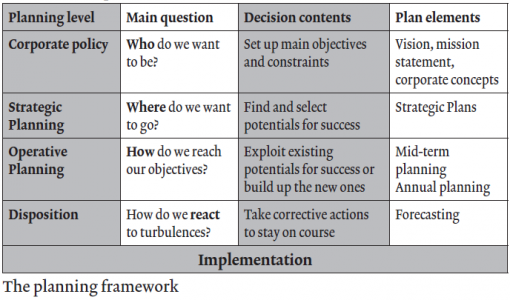Difference between revisions of "Planning and planning framework"
From ControllingWiki
Achtung. Sie nutzen eine nicht mehr unterstützte Version des Internet Explorer. Es kann zu Darstellungsfehlern kommen. Bitte ziehen Sie einen Wechsel zu einer neueren Version des Internet Explorer in Erwägung oder wechseln Sie zu einer freien Alternative wie Firefox.| [unchecked revision] | [unchecked revision] |
| Line 1: | Line 1: | ||
== IGC-DEFINITION (abbreviated) == | == IGC-DEFINITION (abbreviated) == | ||
| − | '''Planning and planning framework'''<br> | + | '''Planning and planning framework | [[:de:Planung und Planungssystematik|Planung und Planungssystematik]]'''<br> |
Planning is the intellectual anticipation of possible future situations, the selection of desirable situations to be achieved (objectives) and the determination of relevant actions that need to be taken to reach those objectives. So the business has constantly to adjust to internal and external changes, requiring decisions to be taken with an eye to future effects. | Planning is the intellectual anticipation of possible future situations, the selection of desirable situations to be achieved (objectives) and the determination of relevant actions that need to be taken to reach those objectives. So the business has constantly to adjust to internal and external changes, requiring decisions to be taken with an eye to future effects. | ||
As a [[controller]], one has to rely on an inter-linked and in itself consistent planning framework. And here the following planning levels have proved their worth in practice: | As a [[controller]], one has to rely on an inter-linked and in itself consistent planning framework. And here the following planning levels have proved their worth in practice: | ||
Revision as of 17:53, 13 December 2010
IGC-DEFINITION (abbreviated)
Planning and planning framework | Planung und Planungssystematik
Planning is the intellectual anticipation of possible future situations, the selection of desirable situations to be achieved (objectives) and the determination of relevant actions that need to be taken to reach those objectives. So the business has constantly to adjust to internal and external changes, requiring decisions to be taken with an eye to future effects.
As a controller, one has to rely on an inter-linked and in itself consistent planning framework. And here the following planning levels have proved their worth in practice:
Operative planning consists of mid-term planning, acting as a hinge, which links long-term strategy and annual planning. Operative planning arises from strategic planning and should demonstrate in budgeted values how the objectives have been apportioned and how they are to be achieved. Annual planning also serves as a basis for the comparison of budgeted and actual figures.
from: IGC-Controller-Wörterbuch, International Group of Controlling (Hrsg.)

